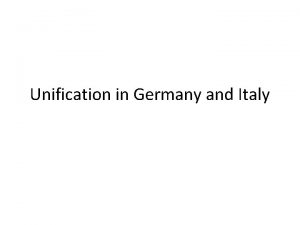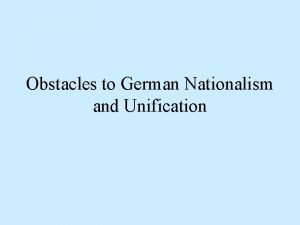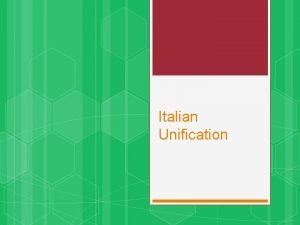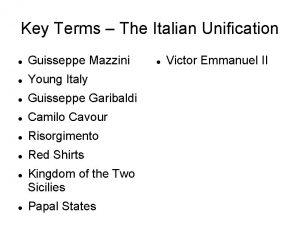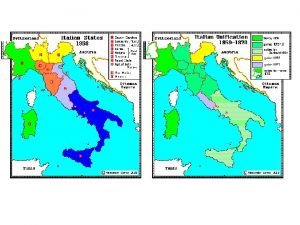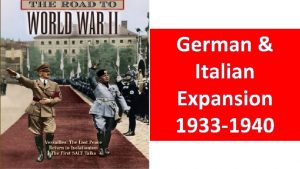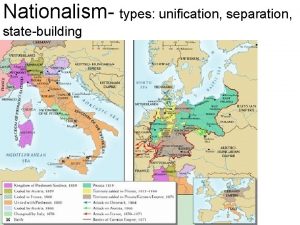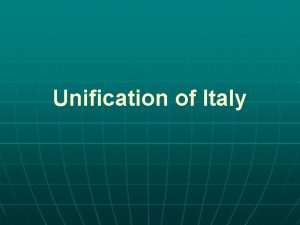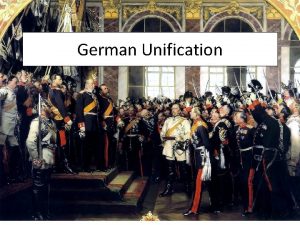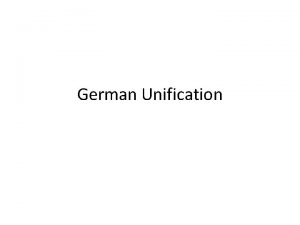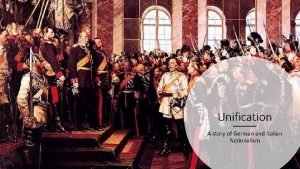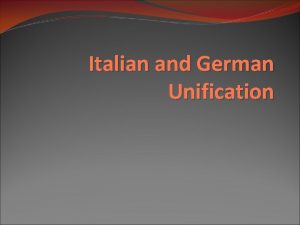Italian and German Unification Mr Whites World History














- Slides: 14

Italian and German Unification Mr. White’s World History

Italy Before Unification �Italy had been politically divided up until the 1800 s �Individual city states were ruled by local families, or by foreign monarchs �Trade barriers, poor transportation, and different Italian dialects discourage political and economic unification

Early Attempts �Early attempts at Italian unification failed �Giuseppe Mazzini formed a secret society for the unification of the Italian states �Mazzini was able to get some Italian states to unify to fight Austrian soldiers who had occupied some Italian cities �This war to expel the invaders failed, but began to get Italians thinking about unification

Victor Emmanuel and Camillo di Cavour �Victor Emmanuel, king of Sardinia, tried to keep support for national unity alive �With the support of his count, Camillo di Cavour, Victor Emmanuel was able to strength Sardinia as a state to be reckoned with by other European powers �Sardinia even participated in the Crimean War, which gave them some say in the end treaty

Sardinia Defeats Austria �Cavour created an alliance between Italy and France against Austria �He then encouraged nationalists in Lombardy to revolt against Austria; in turn, Austria declared war on Sardinia �By the time this war had ended, Sardinia had defeated Austria and had expanded its power with new Italian states that unified with it

Garibaldi and Southern Italy �Giuseppe Garibaldi was a nationalist leader in the southern parts of Italy �He had learned guerilla warfare in South America, and had returned to Italy to lead his supporters in a nationalist uprising �Garibaldi was able to unite many of the southern Italian states with many military victories

The Strength of Prussia �The Congress of Vienna had created the German Confederation as a defensive alliance against France �Different powerful German states existed, led by Prussia and Austria �William I became king of Prussia in 1861 – he supported a strong military for the strength of his nation

Otto von Bismarck �William I appointed Otto von Bismarck as his prime minister �Bismarck shared the king’s view of a strong government and army to achieve national unity �Bismarck supported the idea of realpolitik – a nation should pursue its advantage by any means necessary �Bismarck believed that the issues of the day would be solved by “blood and iron. ”

Bismarck’s Plan �Bismarck wanted to: �Raise money for army expansion �Reduce Austrian influence among the German states �Unify the German states, except Switzerland Austria �Bismarck went to war three times to do this

Prussia’s Wars �First, Prussia allied with Austria to defeat Denmark – this created tensions between Prussia and Austria �Then, he created ties with Russia, France, and Italy to alienate Austria – this results in a war with Austria, which Prussia wins �This establishes the German Confederation, an alliance between German states that Prussia is the head of

Franco-Prussian War �Finally, Prussia and the German Confederation go to war with France �The Prussians quickly and easily defeated the French, using strategy and operational methods similar to Napoleon’s �The German states had unified in this war, in a common alliance against the French

The Unification of Germany �In the French palace of Versailles, the German leaders proclaimed the beginning of the German empire, and thus created Germany �William I became the kaiser of Germany �Bismarck became chancellor

Germany’s Industrial Growth �German political and business leaders worked hard to make Germany an industrial power �With investment from Great Britain, France, and Belgium, Germany quickly modernized and industrialized �By the end of the 1900 s, Germany was a strong industrial power

German Militarism and Bismarck’s End �Bismarck kept socialist groups from taking control of the German government �When William II took power as kaiser of Germany, he continued to work with Bismarck to support German militarism �Bismarck finally resigns in 1890
 German and italian unification compare and contrast
German and italian unification compare and contrast Sardina
Sardina Obstacles to german unification
Obstacles to german unification Stages of german unification
Stages of german unification Reapolitik
Reapolitik Why was italian unification difficult to achieve
Why was italian unification difficult to achieve Obstacles to italian unification
Obstacles to italian unification Italian risorgimento timeline
Italian risorgimento timeline German and italian expansion
German and italian expansion Closing of the western frontier
Closing of the western frontier Low german vs high german
Low german vs high german Quiz
Quiz Ap world history chapter 25 africa and the atlantic world
Ap world history chapter 25 africa and the atlantic world Chapter 23 lesson 3 nationalism unification and reform
Chapter 23 lesson 3 nationalism unification and reform National unification and the national state
National unification and the national state
